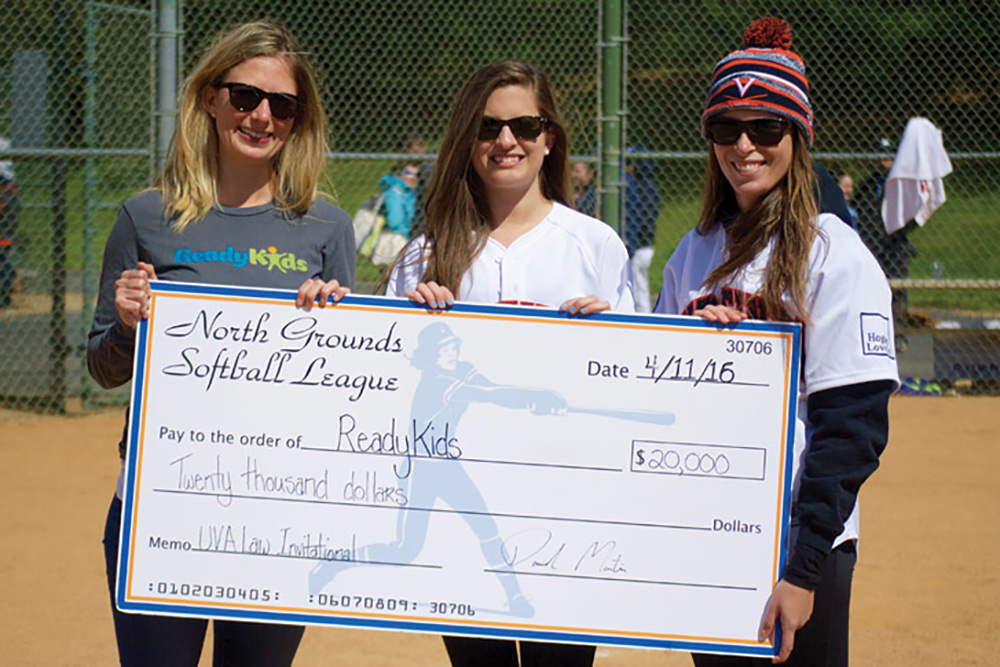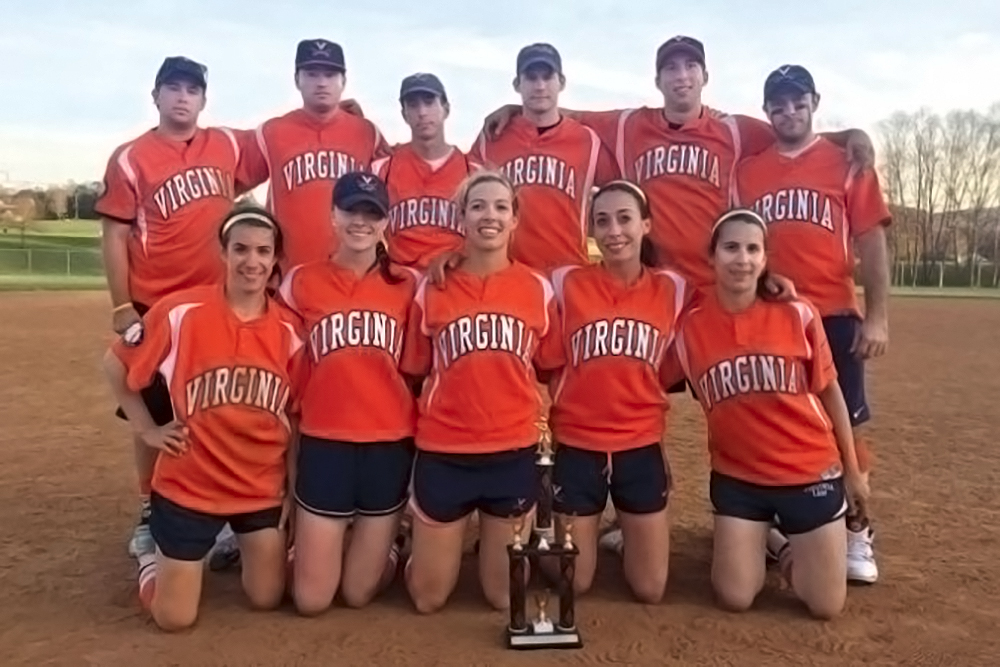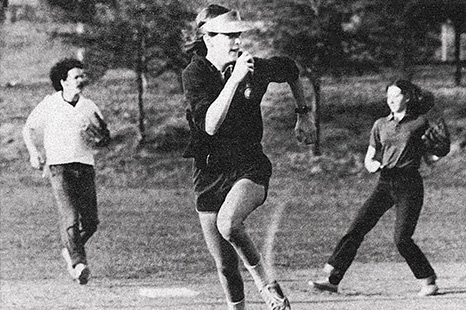When the idea for what would become the North Grounds Softball League first occurred to three University of Virginia students attending the Law School in 1976, they never dreamed the league would spawn a wildly popular charity tournament in which law schools from across the nation would participate.
They simply wanted to play ball.
“The impetus was a lack of things to do on North Grounds,” said UVA law professor and league co-founder Gordon Hylton, who graduated from the School of Law in 1977.
Today, the 40-year-old league, often simply referred to as NGSL, is a nonprofit corporation that runs fall and spring softball seasons at the Law School. The league also hosts the UVA Law Softball Invitational each spring, in which about 115 softball teams from more than 50 different law schools participate. The famed invitational will take place again this weekend, Friday through Sunday.

The softball invitational became a charitable event in 1997. Last year, NGSL donated $20,000 to local nonprofit ReadyKids and $5,000 to the Public Interest Law Association to fund students’ summer jobs in public service. (Law School photo)
In 1976, however, the future of the league was as clear as mud – or at least recently moved earth. The Law School’s new home had just been constructed about 1.5 miles away from Clark Hall, its old location on Central Grounds. Parts of the facility were yet to be installed, including patches of sod in front of the school. The North Grounds Recreation Center and The Park had not yet been created.
But Copeley Field was there. And if it wasn’t exactly whispering like the corn stalks in “Field of Dreams,” it was at least nearby and available for frequent use.
Hylton, who would go on to become a legal historian who often writes about sports, came up with the idea for the league with classmate Fred Vogel, future chief international counsel for the Marriott hotel chain, and Dave Mullins, a year behind them, who later would start his own practice in Christiansburg.
For them, intramural softball on Central Grounds had grown tiresome. Law students often would travel there only to discover a scheduled game had been canceled, Hylton and Vogel said.
Plus, the undergrads played with larger, softer balls – “somewhere between the Chicago-sized ball, which is an abomination, and a regular softball,” Vogel said. What was the point of hitting a homer if the ball didn’t sail?
The three friends received encouragement for their idea from the guys with whom they played pickup games, so they checked in with the Law School about their plan. This was their pitch: “We thought if we had our own league it would be very easy for people to come across the street to play, to do it literally between classes,” Vogel said. “And we thought it would promote collegiality, that it would be a fun thing to do, since North Grounds was kind of isolated.”
The Law School presented no objections and even gave them $200. With the help of Bob Barry, Class of 1978, they ran the idea past the intramural department, which OK’d the dedicated field use and chipped in some basic supplies.
The league coalesced in a brisk two weeks, with the first game taking place Sept. 14. Law Dean Emerson Spies threw out the first pitch (due to President Jimmy Carter being “unable to add this engagement to his commitments,” a response from the White House read).
With names such as “Sliding Scales” and “Homerun Hillbillies,” the 15 teams that played were heavily weighted with male law and engineering students who resided at the Copeley Hill apartments. But a co-ed team “sponsored” by restaurant Ernie’s Crabs (which simply gave them T-shirts) played, too, along with a team of professors led by G. Edward “Ted” White.
“It was phenomenal,” Hylton said. “Everyone showed up for every game.”
The Copeley Singles (whose roster included leisure-time aficionado and future New York Times crossword editor Will Shortz) won the Law School championship that fall over the Mudhens.
Hylton said one of the reasons the league enjoyed early success was the seriousness with which they conducted their fun. Mullins and Vogel, for example, insisted on Astroturf around home plate (to prevent it being washed away by mud) and proper foul poles. The league also paid some of the better student players to be umpires.

The UVA Gold co-rec team finished second in its division in the 2015 invitational tournament. (Law School photo)
It didn’t hurt, either, that Hylton made sure to chronicle the league’s exploits as an editor on the Virginia Law Weekly, and Vogel talked up the league to everyone he could.
“I wanted it very much to succeed,” Vogel said. “I wanted it to be something people looked forward to. And even that first autumn season, it far exceeded our expectations with the number of teams and the enthusiasm people had.”
By the spring of 1977, 40 teams were participating in the league. Play incorporated participants from the Darden School of Business and the Judge Advocate General’s Legal Center and School. The name “North Grounds Softball League,” which more accurately encompassed those playing, stuck.
To this day, the idea continues into extra innings.
Former NGSL Commissioners Share Tales from the Diamond
They experienced the thrill of victory – and the agony of the teeth.
Not to mention a very polite rejection letter from Harvard.
Everyone who has participated in the North Grounds Softball League has a memory. In honor of the 40th year of NGSL, past commissioners shared some of their favorite stories.
Dylan C. Black, a 1997 Law graduate and partner with the Birmingham office of the law firm Bradley Arant Boult Cummings, was head commissioner when he was a third-year law student. He recalled that year as the first in which there were enough extra proceeds from the invitational tournament to donate to charity.
“Now the league is regularly delivering five-figure checks,” Black said.
But two years earlier, he witnessed something else that was memorable: the rarely executed triple play. He was on the field with his team, Co-Rec Gold, when his Class of ’97 teammates accomplished it.
“I was pitching and the ball was hit sharply at our third baseman, Steve Slazinski, who was covering the line,” Black said. “He stepped on the bag, relayed to our second baseman, who was Debbie Owen – now Debbie Owen Pell; she had played softball for Virginia. She turned that play slicker than Ozzie Smith. Turned it and threw to Erinn Kelly [Robinson] to get the runner at first.”
The team would go on to win the 1995 tournament.
Inevitable with tales of glory are also reports of injuries. Ex-commissioners recounted: a hopper to the chin that resulted in stitches; a broken nose; and countless torn ACLs (resulting once in a whole team with knee braces called the ACLUseless).
Allison Lansell, a 2012 graduate and health care attorney with Rolf Goffman Martin Lang in Cleveland, lost a tooth in pre-season intramural play her first year. But she didn’t let that stop her from participating in NGSL, and later serving as a commissioner.
In a way, it was part of the bonding process, she said.
“I ended up being taken by ambulance to the ER where, unbeknownst to me, my Peer Advisor, Rebecca Martin, who was on NGSL, sat for more than four hours in the waiting room to make sure I had a way to get home,” Lansell said. “When I got into NGSL, she was the first one to come up and give me a hug and introduce me to the rest of the organization.”

The tooth was re-attached, by the way. No harm, no foul.
The incident even led afterward to an academic discussion with then-Dean Paul Mahoney and Professor John Harrison about the assumption of risk at baseball games, Lansell said. (Harrison reportedly had once been the victim of a stray ball himself.)
Other NGSL memories came from off the playing field.
1984 alumnus Thomas G. McNeill, a member at Dickinson Wright in Detroit, was a head commissioner who, along with friend and William & Mary law student Bob Battle, came up with the idea of UVA hosting an invitational. Today, more than 50 different law schools send teams to compete.
But in the beginning, the students weren’t sure to whom the invites should be sent.
“We sent letters all over,” McNeill said. “Some replied ‘Thanks, but no thanks.’ From most we heard nothing.”
But he said one reply stood out. The dean of Harvard Law sent a personal note, which, despite being an unequivocal no, was thoughtful in its “elegant and eloquent response.”
Media Contact
Article Information
April 5, 2017
/content/glory-days-law-school-reflects-40-years-playing-ball

